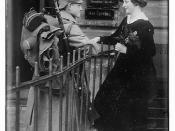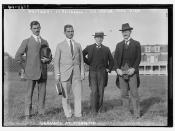Nonviolent resistance is often criticized for being ineffective or futile against a determined ruthless and oppressive opponent (Summy 1994: 2). Against a less ruthless opponent, for example a democratic regime, non-violence is arguably more successful. This is because democratic regimes have institutional checks and balances which constrain state instruments of power from acting in the same manner that dictatorships would. Thus, as Kim Beazley identifies, Mahatma Gandhi's largely nonviolent satyagraha struggle against British imperialism succeeded because of the moral constraints faced by the occupying British (Beazley, cited in Summy 1994: 5), as well as the risk of political damage back in Britain. This then begs the question of how effective nonviolent resistance would be against ruthless despots like Stalin, Hitler and their totalitarian states. Through an analysis of the nature of the totalitarian regimes in question, and an analysis of attempts to nonviolently challenge these regimes, this paper will argue that depending on certain factors, nonviolent resistance can be of some use against a totalitarian rival.
In the end however, the instances of nonviolent resistance against such regimes were only partially successful, and ultimately it was violence, and in Stalin's case death, which brought about their demise.
Although nonviolence as a form of resistance rose to prominence following the ousting of the British from India, the history of nonviolence can be traced back to Republican Rome circa 300 B.C, when plebeian peasants refused to pay a senate issued levy to fund a forthcoming war (Mommsen 1968: 109). Nonviolent resistance can encompass a wide range of strategies, some of which are not effective in all situations. Broadly, according to Bob Irwin and Gordon Faison, nonviolent resistance can take the form of protest and persuasion, non-cooperation and intervention (1984: 2). Gene Sharp goes into further detail by including economic boycotts, strikes and...


![[German vehicle tax registration issued to George Grantham Bain] (LOC)](https://s.writework.com/uploads/6/60390/german-vehicle-tax-registration-issued-george-grantham-bain-thumb.jpg)
Non-Violence, Naziism, and Stalinism
I think the thesis may slightly overstate what the research can support.
That notwhitstanding, this is a very well-written, and very well-researched paper. It is genuinely a university level product, and something that the writer should be proud of. Bravo.
0 out of 0 people found this comment useful.